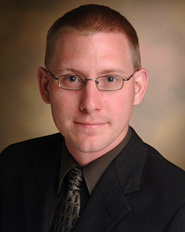
Alan Theisen (b. 4 October 1981; Port Huron, Michigan) is a Ph.D. graduate assistant in the Department of Music Theory at the Florida State University.
Composing since the age of sixteen, he has produced a steadily growing body of work distinguished by its musical energy and concentration of expression.
Representative works by Theisen include a Sonata for Alto Saxophone and Piano, Variations on a Theme of Gretchaninov, Eclogue for flute, and the Concerto for Alto Saxophone and String Orchestra (premiered by soloist Lawrence Gwozdz and the Szczecin Philharmonic in 2004). Recent compositions and commissions include Ritorno for flute and cello and a Triple Concerto. Noted composer Dimitri Terzakis commends Theisen's oeuvre as being "the product of a unique talent."
As a saxophonist, Theisen has toured the United States and Canada with the Sax-Chamber Orchestra, performing at two World Saxophone Congresses (Montreal - 2000, Minneapolis - 2003). He studied the instrument with internationally-recognized performer Lawrence Gwozdz and participated in masterclasses with famed saxophone pioneer Jean-Marie Londeix. No stranger to the podium, Theisen has been a guest conductor with several ensembles.
In an effort to showcase both his own original compositions and pieces by other contemporary composers, he founded the Intégrales New Music Festival in 2005. Now an annual event, Intégrales NMF features world-premiere performances by nationally recognized musicians. Intégrales has expanded to include musical collaborations with artists, authors, and dancers.
Theisen wrote his undergraduate thesis on György Ligeti's Piano Etudes, and has authored several papers on topics including Elliott Carter, film editing, composition as analysis, and Michael Brecker.
Other interests include mathematics, film criticism, and philosophy; in addition, Theisen has performed the role of Oberon in a production of Shakespeare's A Midsummer Night's Dream, for which he also wrote the incidental music.
Theisen lives with his wife (and puts up with their two cats) in Tallahassee, Florida.
|
|
|
|
|
|

Saturday, July 14, 2007
Concerto Redux - Part 1
As promised, here is the first installment in my series of essays chronicling the composition of a new finale for my Concerto for Alto Saxophone and Wind Ensemble.
The Concerto (with wind ensemble) is a re-orchestration of my earlier Concerto for Alto Saxophone and String Orchestra (2002). The original is three movements long, containing: an introductory, elegiac Larghetto; a short scherzo entitled Burlesque; and a slow and meditative Passacaglia which brings the work to a quiet close.
The Concerto was premiered in the spring of 2004 in Poland. Although I was unable to attend due to financial reasons, the performance was a success. The soloist performed remarkably, the string orchestra was fine, and audience reaction was strongly positive. The latter fact made me especially happy, since most audience members expect a loud, flashy ending when a Concerto is on the program. The soloist/dedicatee was pleased with the overall scope and narrative of the composition, but was really aching for the prescribed “bang-‘em-up” finale. I declined his urging to write one, and continued to decline for the next five years. I truly believed (and currently believe) that the composition needed no amendments.
Earlier this summer, the dedicatee informed me that he was invited to perform a concerto with his university’s excellent wind ensemble. By remarkable coincidence, I informed him that I had planned on re-working my Concerto for band accompaniment. It was settled. He would perform the new version of the Concerto in December 2007. I had better get a move on!
I began plugging away at the re-orchestration in late June, as I have to mail the score to the ensemble’s conductor by mid-August. Of course, the conversion from a body of strings to a body of winds requires some radical tweaking at times – actually, all of the time. I found myself changing much more of the composition than I had originally planned. The solo part remained unchanged, but the accompaniment was becoming a different piece entirely! Then the thought occurred to me: why not write that dastardly fourth movement and truly make this a different concerto?
But what should I do? As aforementioned, I feel that the narrative of the Concerto as it stands with three movements forms a fine arc. Why disrupt that? What could I possibly add that I hadn’t said already? Furthermore, the material is five years old and I’m certainly not the same person or stylistically the same composer I was when I was 20.
I decided to make this property a strength instead of a weakness. The new finale would almost be a separate work; it would use material from the original three movements and utterly transform them, commenting on my composition from five years ago through the lens of my experience today. The fourth movement would be a kind of analysis, an explosion of my previous thoughts. Everything fell into place and I began work immediately. I started composing the new finale on Wednesday morning; almost 72 hours later, I have the first minute composed, orchestrated, and in Finale.
I’ve given the title “Epicrisis” to the new finale, as I am quoting material in order to comment upon it. Thank you, rhetorical terminology.
More to come as I write, write, write…
Next time, I’ll show you clips of the fourth movement and where some of the material comes from.
posted by Alan Theisen
|
| |



